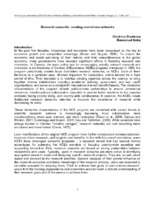| dc.contributor.author | Dimitrova, Dimitrina | |
| dc.contributor.author | Koku, Emmanuel | |
| dc.date.accessioned | 2018-09-02T06:31:07Z | |
| dc.date.available | 2018-09-02T06:31:07Z | |
| dc.date.issued | 2011 | |
| dc.identifier.uri | http://cladista.clad.org//handle/123456789/6910 | |
| dc.description.abstract | Current policy makers in the area of science and innovation assume that when users are more engaged in the research process, they are able to communicate their needs better to researchers and are better prepared to adopt the research results. Research consortia, which are predicated on meeting user needs, are expected to enable much more active user involvement thereby facilitating knowledge transfer exchanges and innovation. | |
| dc.description.abstract | This study examine whether the research consortia program of a Canadian non-profit organization achieves its goals to actively engaging end users in the research process. While other evaluative studies focus on program procedures and outcomes, this research uses social network data and qualitative interviews to explore information exchanges among the researchers and users in the consortia. The analysis focuses on advice exchanges among the researchers and users in the consortia that lead to a shared understanding of research goals and research means as well as to building trust among consortia participants. | |
| dc.description.abstract | The results suggest that users actively participate in the advice exchanges and are even more engaged in the program than the researchers. The findings also point to the central role of the non-profit organization staff in advice exchanges, indicating that designed research networks may require more facilitation and infrastructure than previously though. Finally, the study finds that users and researchers actively exchange advice with each other; i.e. there are intense learning processes in the network. The study shows that research consortia succeed in actively engaging users and, in addition, sheds light on how such engagement potentially may lead to more user-oriented research results and better adoption. | |
| dc.format.extent | 16 p. | |
| dc.language | Inglés | |
| dc.publisher | York University. Sociology Department | |
| dc.rights | Creative Commons BY-SA-NC 4.0 Int | |
| dc.rights.uri | http://creativecommons.org/licenses/by-nc-nd/4.0/ | |
| dc.subject | CONGRESO CLAD 16-2011 | |
| dc.subject | PARTICIPACION CIUDADANA | |
| dc.subject | REDES SOCIALES DIGITALES | |
| dc.subject | ORGANIZACION NO GUBERNAMENTAL | |
| dc.subject | PROGRAMAS DE INVESTIGACION | |
| dc.title | Research consortia: creating user-driven networks | |
| dc.type | article | |
| clad.congress | Congreso Internacional del CLAD sobre la Reforma del Estado y de la Administración Pública, 16 | |
| clad.key | MFN44854-- | |
| clad.key1 | KEY | |
| clad.md5 | 11e904532ee319b396a3c092974af518 | |


